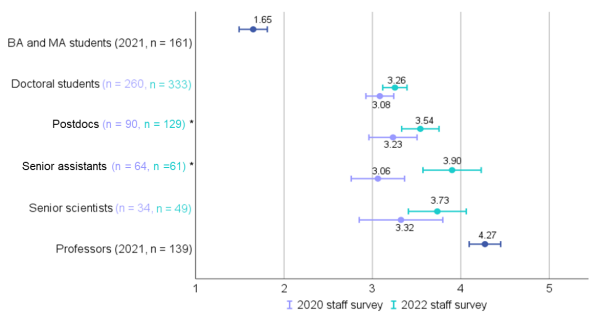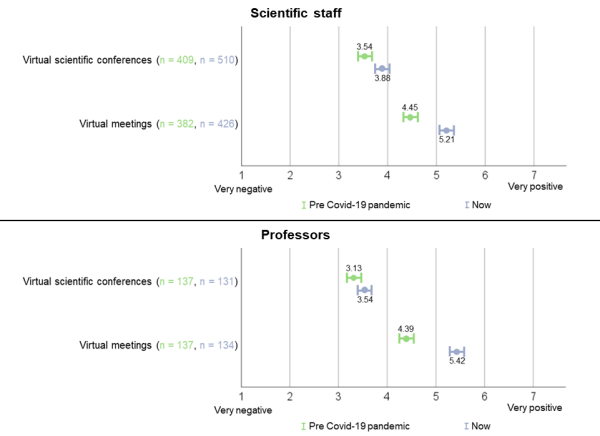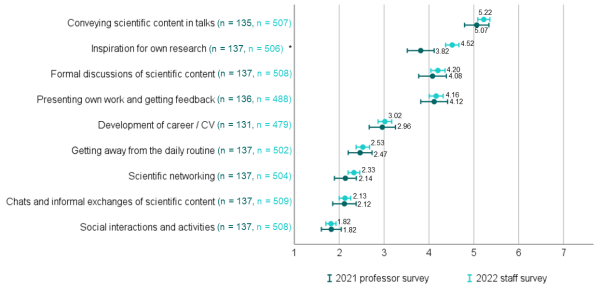Supporting Research
Since 2018, the ETH Air Travel Project has been receiving scientific support in the context of doctoral theses at the Transdisciplinarity Lab of the Department of Environmental Systems Sciences.
The Transdisciplinarity Lab (TdLab) at the Department of Environmental Systems Sciences (D-USYS) carries out research and teaches on inter- and transdisciplinary collaboration in the field of sustainable development. Since the inception of the ETH Air Travel Project, two PhD theses have emerged from the TdLab, providing scientific support for the project.
From 2018 to 2021, the air travel project was scientifically supported by external page Agnes Kreil, former PhD student at TdLab, as part of her dissertation. Since 2021, Ariane Wenger, also at TdLab, continues to accompany the project with her current PhD thesis. Both doctoral students conducted surveys at ETH Zurich to investigate the internal perceptions surrounding the Air Travel Project.
Results of the five ETH-internal surveys
Perceptions of and attitudes towards the ETH Air Travel Project
The ETH-internal surveys show that the majority of the surveyed professors (2020: 92%), scientific staff (2020: 57%, 2022: 54%), and 42% of the surveyed students (2021) are aware of the Air Travel Project. An overwhelming majority of all ETH employees (scientific staff 2020: 84%, professors 2020: 72%, professors 2022: 75%) and students (2021: 93%) support the project. Most ETH members consider the issue of greenhouse gas emissions from work-related air travel at universities to be important (scientific staff 2020: 81%, scientific staff 2022: 76%, professors 2020: 73%, professors 2021: 79%), although the perceived relevance of air travel for studying/working at ETH varies strongly between different academic positions (Fig. 1).
The survey conducted in 2020 among ETH scientific staff shows that the researchers surveyed feared that a reduction in their air travel would lead to missed opportunities for building personal relationships with scientists working abroad and to fewer opportunities for a successful professional career. Nevertheless, the scientific staff members suggested more ambitious reduction targets than those previously adopted by the departments.
Impact of the COVID-19 pandemic and attitudes towards virtual communication
The three surveys conducted during the COVID-19 pandemic show that ETH members believe that the pandemic has demonstrated how at least some of the work-related air travel at universities can and should be replaced by virtual communication. The scientific staff as well as the professors retrospectively perceive virtual communication more positively after the pandemic compared to before, although they generally have a more positive attitude towards virtual meetings than towards virtual conferences (Fig. 2).
ETH members consider virtual formats as unsuitable for getting to know each other, building new relationships, developing collaborations, and for social interactions and networking (Fig. 3). Nevertheless, they also see advantages in virtual formats, such as the reduction of CO2 emissions, time, costs, and travel stress, the availability of recordings, and the better inclusion of various participants.



Articles and reports on the internal perception of the ETH Air Travel project
- Survey among ETH scientific staff (2022): external page Air travel at ETH – Results from a survey among scientific staff
- Survey among ETH professors (2021): external page Air travel at ETH – Results from a survey among professors
- Survey among ETH students (2021): external page Air travel at ETH – Results from a survey among students
- Article by Agnes Kreil in the journal "Travel Behaviour and Society" (2021): external page Does flying less harm academic work? Arguments and assumptions about reducing air travel in academia
- Survey among ETH professors and scientific staff (2020): external page Attitudes toward professional air travel at ETH Zurich